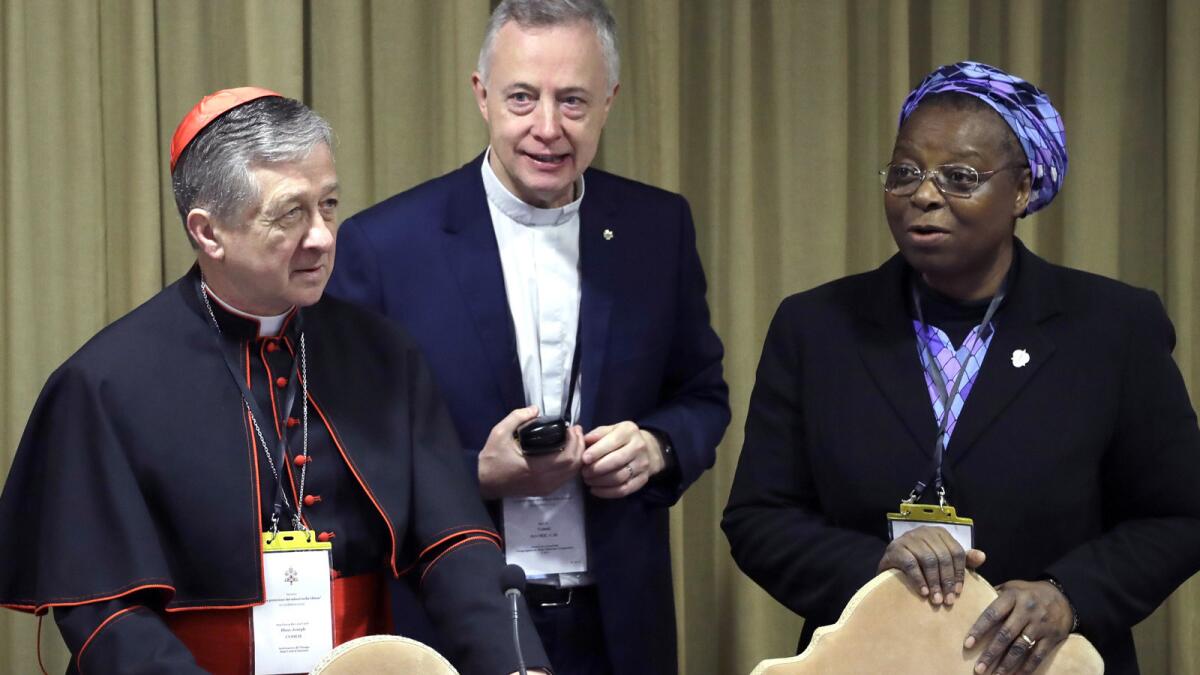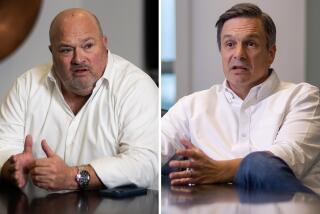Women take Catholic bishops to task at Vatican abuse summit

- Share via
Reporting from VATICAN CITY — A prominent Nigerian nun blasted the culture of silence that has long kept clergy sexual abuse hidden in the Catholic Church, telling Catholic leaders Saturday that they must transparently admit their mistakes to restore trust among the faithful.
A Mexican journalist followed up, telling the bishops and others at Pope Francis’ abuse summit that their collective failure to report abuse and inform their flocks about predator priests made them complicit in the crimes.
In between those admonitions, a German cardinal admitted that church files about abusers had been destroyed, victims were silenced and church procedures were ignored — all in an attempt to keep the scandal under wraps.
Sister Veronica Openibo, Mexican correspondent Valentina Alazraki and German Cardinal Reinhard Marx delivered powerful speeches to nearly 190 church leaders on the third day of the pope’s four-day tutorial on preventing abuse and protecting children.
The first two days focused on the responsibility of church leaders in tending to their flocks, and how they must be held accountable when they fail to properly protect young people from predator priests. Saturday was dedicated to issues of transparency and breaking the code of silence.
And it was dominated by women.
Openibo was one of only a handful of women invited to the meeting, and she used her time at the podium to shame the church leadership for their silence in the face of such crimes.
“How could the clerical church have kept silent, covering these atrocities?” she asked. “We must acknowledge that our mediocrity, hypocrisy and complacency have brought us to this disgraceful and scandalous place we find ourselves as a church.”
Alazraki, the longtime Vatican correspondent for Mexico’s Televisa, challenged the leaders to decide whether they are on the side of the priests accused of abuse and those who cover up the crimes, or the victims.
“We have decided which side to be on,” she said, warning that unless they side with victims “journalists, who seek the common good, will be your worst enemies.”
Marx called for a redefinition of the Vatican’s legal code of secrecy and for the publication of statistics about cleric sex abuse. He said such transparency would be a first step toward restoring trust with the faithful.
Francis demanded that the conference be held to impress on church leaders that sex abuse isn’t just a problem confined to a few countries, but the whole church. He did so after he botched a case of cover-up in Chile and after the scandal exploded in the U.S., sparking a crisis of confidence in the Catholic hierarchy.
Survivors who have gathered in Rome to protest marched toward the Vatican shouting “Zero tolerance!”
Among them was Alberto Athie of Mexico, one of the original accusers of the pedophile founder of the Legion of Christ, the Rev. Marcial Maciel. The decades-long cover-up of Maciel’s well-documented crimes has been a stain on the legacy of St. John Paul II.
“To protect the abusers means ‘Don’t say it to the authorities, don’t say it to the parents, don’t say it,’” Athie said.
In her speech, Openibo, the superior of the Society of the Holy Child Jesus religious order, recalled the Oscar-winning film “Spotlight,” based on the Boston Globe’s prize-winning expose of clergy abuse and cover-up that sparked the explosion of cases coming to light in the U.S. in 2002.
It was at least the second time that the film has been referenced positively during the summit — evidence of a radical change in attitude at the Vatican toward media exposes of sex abuse.
Openibo also told African and Asian church leaders they must no longer justify their silence about sexual violence by claiming that poverty and conflict are more serious issues.
“This storm will not pass by,” she warned them.
She called for talks on controversial issues to address the scandal, including lay participation in the selection of bishops, the question of whether seminaries for young boys are healthy and examination of why elderly abusers aren’t dismissed from the clergy.
Openibo also praised “Brother Francis” for his honesty in admitting he had erred in an abuse cover-up case in Chile last year. Francis had defended a bishop accused of witnessing and ignoring the abuse of a notorious predator, accusing the victims of “slander.”
“I admire you, Brother Francis, for taking time as a true Jesuit, to discern and be humble enough to change your mind, to apologize and take action — an example for all of us,” Openibo said.
Alazraki, who has covered the Vatican since the pontificate of Pope Paul VI, urged greater transparency and offered advice about the growing revelations of nuns who have been sexually abused by priests and bishops.
“I would like that, on this occasion, the church play offense and not defense, as has happened in the case of the abuse of minors,” she told the gathering. “It could be a great opportunity for the church to take the initiative and be on the forefront of denouncing these abuses, which are not only sexual but abuses of power.”
A man and a woman who were sexually abused by priests as young people also addressed Catholic leaders, saying the trauma they suffered has haunted them ever since. The man, speaking at a penitential liturgy Saturday night, said sexual abuse is the greatest humility anyone can suffer:
“You realize you cannot defend yourself against the strength of your oppressor. You cannot escape. You must endure it,” he said.
The woman, addressing the summit Friday night, said she had wanted to tell them about her childhood.
“But there’s no point, because when I was 11 years old, a priest from my parish destroyed my life. Since then I, who loved coloring books and doing somersaults on the grass, have not existed,” she said.
They were not identified to protect their privacy.
Participants seemed to appreciate the lessons of the summit.
“Everybody is on the same page now: that this is a crime that must be tackled,” said Bishop Augustine Obiora Akubeze, president of the Nigerian Bishops Conference.
Panama Archbishop Jose Domingo Ulloa Mendieta said he was looking forward to Francis’ final speech on Sunday.
“This is a time to reflect, to find more awareness on the gravity of minors’ abuse,” he said. “What we hope most for is that tomorrow, during conclusions, that the Holy Father will give us concrete guidelines to follow.”
More to Read
Sign up for Essential California
The most important California stories and recommendations in your inbox every morning.
You may occasionally receive promotional content from the Los Angeles Times.









